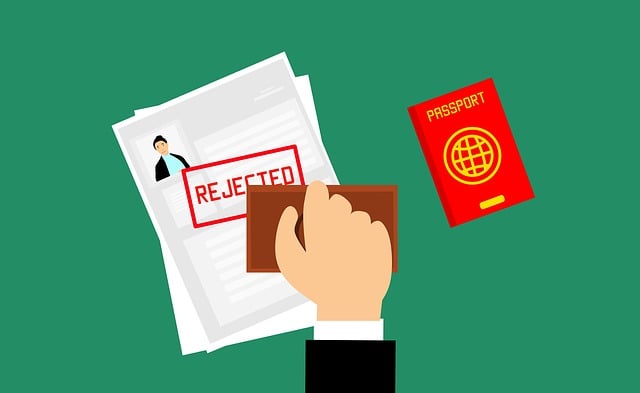Can previous visa rejections affect your visa application in the future? You’ll find out in this article.
Applying for a visa is necessary for individuals seeking to travel, study, or work abroad. This is because a visa is the only document granting legal entry and exit into your country of choice.
Students already offered admission in a foreign country will most likely get their visa application approved. All they have to do is provide proof of admission and funds or sponsorship. For others, only some get approval on their first visa application.
A major concern for applicants denied a visa is the impact it could have on their future applications. Understanding this will help you pay more attention to the visa application process.
Reasons Your Visa May Be Denied
There are several reasons why your visa application may be rejected or denied. For first-timers, knowing this will help you avoid certain mistakes. If you have been denied before, you may find the reason you were denied a visa and others you should avoid if you’re reapplying.
1. You don’t have enough money:
unless your trip is funded by a sponsor, you will have to show proof that you have enough money to spend throughout your stay. This is the most common reason visa applications get rejected. So be sure to find out the minimum amount you need to have before you apply for a visa to any country you wish to travel to.
Also Read: Which Schengen Countries Are the Easiest to Get a Student Visa?
2. Not following the visa application guidelines:
Immigration offices have rules that should guide your application. Not following these guidelines may set you up for a visa denial.
3. Failure to meet the eligibility criteria:
Each type of visa has specific eligibility criteria set by the immigration authorities. This may include financial requirements, health standards, educational qualifications, or language proficiency. If the applicant fails to meet any of these criteria, the visa application may be rejected.
4. Suspicion of intent to overstay or work illegally:
Immigration officers will check whether the applicant has intentions to visit the country temporarily and return to their home country afterward. If there are doubts about the applicant’s intentions, he/she will be denied a visa.
One of the reasons this suspicion can arise is if the applicant does not have enough ties to their home country. Ties such as family, businesses, or property. Also, limited financial resources and Inconsistencies in travel plans may raise this suspicion. Suspicion due to any of these will lead to the visa application being rejected.
5. Security concerns:
Visa applications are subject to security checks. This is to ensure that the applicant does not pose a threat to the country’s security. This includes screening for criminal records, involvement in terrorist activities, or affiliations with organizations deemed to be a security risk. If there are any security concerns, the visa application may be denied.
6. Previous immigration violations:
Violations include:
- Overstaying a previous visa
- Illegal entry into a country, or
- Engaging in unauthorized employment.
If an applicant is guilty of any of these, it can negatively impact their visa application. Immigration authorities may view such behavior as a risk factor for future violations and reject the application as a result.
7. Previous visa rejections:
If you have been denied a visa before, it may affect your reapplication for a visa. The higher the number of rejections, the higher the chances of another visa rejection.
How Previous Visa Rejection(s) Can Affect Your Future or Current Visa Application
Back to the question of whether previous rejection (s) can affect new applications and how.
Increased Scrutiny:
When an applicant has a history of visa rejections, subsequent applications are often subjected to increased scrutiny. Immigration authorities may view such applicants with greater skepticism or doubts, leading to more thorough evaluations of their eligibility.
Negative Perception:
Multiple visa rejections can create a negative perception of the applicant’s credibility and intentions. Immigration officers may question the applicant’s motives for repeated attempts, raising concerns about potential immigration violations or fraudulent activities.
Risk Assessment:
Visa officers assess the risk associated with each application, considering factors such as the applicant’s ties to their home country, financial stability, and previous travel history. Repeated rejections can signal a higher risk to immigration authorities, potentially leading to further documentation requirements or denial of the application.
Impact on Travel History:
Visa rejections leave a mark on the applicant’s travel history, which can affect future visa applications to other countries. Many immigration systems share information, and previous rejections may influence decisions made by other countries’ immigration authorities.
How to Improve Future Visa Applications
- Identify Reasons for Rejection:
Applicants need to understand the reasons for their previous visa rejection, as this will help them avoid repeating the mistakes. The letter from the consulate will state the reasons your application was denied. If you do not understand the reasons, reach out to the embassy to get more clarity. - Seek Professional Advice:
Consulting with immigration experts can provide useful insights and guidance. These professionals can review previous rejections, identify areas for improvement, and assist in preparing a stronger application. - Provide Complete Documentation:
Ensure that all required documents are complete, accurate, and well-organized. This is necessary for demonstrating eligibility and credibility. Applicants should provide evidence of their purpose of travel, ties to their home country, and financial stability. - Demonstrating Changed Circumstances:
If there has been a change in your circumstances, you need to show it when you reapply. For instance, a change in your financial capacity since your last application. New employment opportunities also, or if you set up a thriving business. You need to document these changes and submit them alongside your application. - Prepare for the Interview:
Don’t just show up for your visa interview. Review possible or past interview questions before your interview date. dress well. Also, give honest answers to the questions you will be asked.
Also Read: How to Choose the Best Country to Do Your Masters’ Degree Abroad as a Nigerian
Conclusion
We have seen how previous visa rejections can impact future visa applications. Thus, It is important to put in careful preparation and pay attention to detail when reapplying. This will help improve your chances of success.
By understanding the reasons for past rejections and taking proactive steps to address them, individuals can navigate the visa application process with greater confidence and increase their chances of obtaining approval.

























